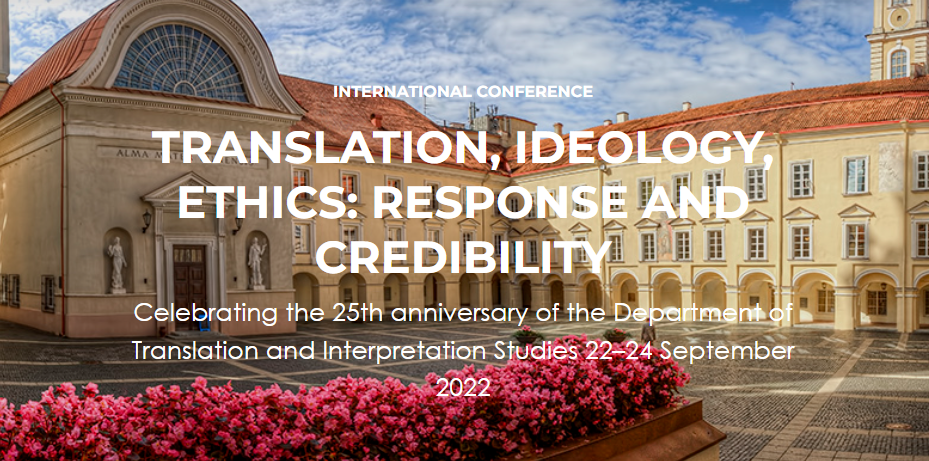Call for papers
15 March 2022

International conference
Translation, Ideology, Ethics: Response and Credibility
with the International Translating Europe Workshop
Ethics in the Era of Machine Translation
Department of Translation and Interpretation Studies, Faculty of Philology, Vilnius University, Lithuania
22–24 September 2022
Department of Translation and Interpretation Studies at the Faculty of Philology of Vilnius University cordially invites you to celebrate its 25th anniversary by revisiting the place, role and impact of translation in the broad, dynamic social and multicultural communicational context, and to take part at the international conference on Translation, Ideology, Ethics: Response and Credibility which will include the international workshop on Ethics in the Era of Machine Translation.
Nowadays global processes invite ever-increasing multicultural interaction, exchange of ideas and multinational coordination, therefore the demand for translation and its significance are growing, respectively raising visibility of translation as mediation, and of its participants. As translation never takes place in the vacuum and the need for it emanates in the contexts that are saturated with various ideologies, cultures and stands, the very process of translation, its product, and participants are affected by these contexts and make an impact on them. Recent geopolitical changes, fast-growing communication technology, media intervention into the spheres that used to belong exclusively to home affairs, global quest for information and its deliberation in social networks highlighted the questions of reliability of translation and trust in it, and emphasised responsibility of translators and translation technologies. The collisions of ideologies, combined with the ethical stances that translators have to assume in response have drawn attention to the risks associated with translation situations that extend beyond the text and directly affect the participants of those situations. These developments consequently touch the field of Translation Studies which, as it is rightly noted by Susan Bassnett and David Johnston, is necessarily situated in the context of the ‘issues alive in the perceptions and relationships of our world today.’
We hope to expand the discussion on interrelation between translation, ideology and ethics, by inviting papers addressing, but not limited to the following questions:
* How do ideologies affect the field of translation?
* What is characteristic of the process of translation in crisis situations?
* What are translator’s ethical choices in crisis situations?
* What are the ideological assumptions and implications of translation from/into major and minor languages?
* How does translation influence our positions and values, and form our images and perception of ourselves and others?
* How do we perceive history of translation? How does the history of translation function in the collective and individual memory?
* What is a rendition quality of ideological and ethical contents in human and machine translation? Who is to be held responsible for reliability of translation?
* How is the notion of translation ethics changing?
* What skills are to be acquired by translators in the developing situation when they cease being perceived as merely a passive channel of transmission and assume a more active role of a communication moderator? How do these changes affect translator training?
* How do Translation Studies respond to the changing milieu? What problems and ethical challenges do researchers in TS face? How is the inquiry into translation enriched by the multidisciplinary, transdisciplinary and supradisciplinary research approach? Is the translation research trusted in the view of ideological and ethical differences? What are the most relevant perspectives in nowadays translation research?
We are inviting papers touching upon these topics in different subfields of TS, including history (of) translation, (N)MT, audiovisual, literary, political, parliamentary, news, media and debates translation, and conference and community interpreting. Papers given by researches working in the field of ethics, political ideologies, intercultural relations, semiotics, socio- and psycholinguistics, psychoanalysis, memory studies, discourse analysis, imagology, textual criticism, and literary and classical studies with the focus on translation are also very welcome.
The workshop will cover a wide range of current trends in translation research, as well as its application to translation industry and public sector.
REFERENCES
Bassnett, S., Johnston, D. 2019. The Outward Turn in Translation Studies, The Translator, 25:3, 181–188.
Hatim, B., Mason, I. 1997. The Translator as Communicator. Routledge.
Lefevere, A. 1992. Translation/History/Culture. London, New York: Routledge.
Venuti, L. 1995. The Translator's Invisibility. London, New York: Routledge.
KEYNOTE SPEAKERS
Prof. dr. Jorge Díaz-Cintas, University College London, United Kingdom
Prof. dr. Nike Kocijančič Pokorn, University of Ljubljana, Slovenia
Prof. dr. Sharon O'Brien, Dublin City University, Ireland
Assoc. prof. dr. Elisabet Tiselius, Stockholm University, Sweden
ABSTRACT SUBMISSION
Conference and Workshop languages are English and Lithuanian. Please submit abstracts of no more than 250 words, in English or Lithuanian by 20 June 2022 using the online abstract submission form: Abstract submission
Notification of acceptance will be given by 1 July 2022.
Due to COVID 19 situation, in order to mitigate possible risks, we are planning our conference to be held in two formats: Live at Vilnius University (Vilnius, Lithuania), and online via ZOOM platform. Should the pandemic situation require, the whole conference will be held online.
If you have any questions related to this call, please feel free to contact Žygimantas Pekūnas on behalf of our organizing committee:
Details of the scientific and organizing committees, as well as all other information pertaining to the conference and workshop, are available on the website: Translation, Ideology, Ethics: Response and Credibility – 22–24 September 2022












